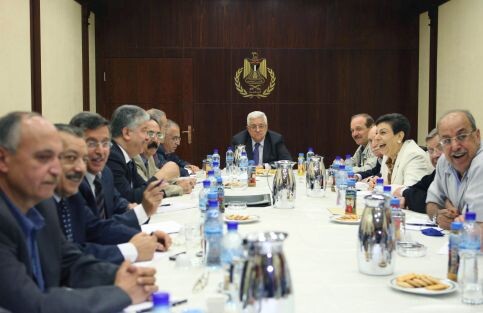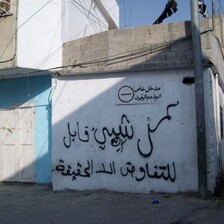The Electronic Intifada 25 August 2010

The PLO Executive Committee convenes in the occupied West Bank city of Ramallah, 20 August 2010. (Omar Rashidi/MaanImages)
Palestinian political leaders and activists, outraged by the Palestine Liberation Organization’s (PLO) approval of direct talks between the Palestinian Authority and Israeli leaders next week, attempted to converge in the occupied West Bank city of Ramallah today in a meeting aimed at “express[ing] or stand[ing] against a return to negotiations,” Ma’an News Agency reported (“Police shut down conference against talks,” 25 August 2010)
The meeting was held at the same time as a conference in Gaza City, where officials of various Palestinian parties also discussed their opposition to the PLO’s plans for direct talks.
According to Ma’an, and corroborated by the Palestinian human rights group Al-Haq, the Ramallah meeting was interrupted and shut down by the Palestinian Authority’s General Intelligence forces, who provoked participants and attacked individuals trying to document the incident.
Khaleda Jarrar, Ramallah mayoral candidate with the Popular Front for the Liberation of Palestine (PFLP) party, told Ma’an that participants in the meeting were confronted by Palestinian Authority (PA) forces in civilian uniform, who “attempted to thwart the event from the start, chanting slogans and leading event participants towards the center of Ramallah.”
“We aimed to voice our dissent, and the PA decided to enter the conference hall and drag participants out to an unplanned rally,” continued Jarrar. The PA has made it an ongoing policy to prohibit “unplanned” rallies by opposing political groups.
Al-Haq, whose offices are located next to the Protestant church where the meeting was held, stated in a press release that some of its staff members attempted to document the events and were subsequently attacked by the PA forces.
“Upon seeing one of the staff members, Wesam Ahmad, equipped with a camera, plain-clothed General Intelligence officers accosted him and knocked the camera from his hand,” stated Al-Haq. “After retrieving the camera and asking why he was being prevented from taking any pictures, Mr. Ahmed was surrounded by approximately 10 members of the GI. They grabbed him around the neck and head while holding his arms, stripping the camera from him. During the attack, another Al-Haq staff member, Ms. Nina Atallah, who tried to intervene to assist her colleague, was injured and had to be taken to hospital. … It emerged, after asking policemen on the scene, that Al-Haq’s camera had been confiscated by the GI. Equipment and footage from journalists on the scene were also confiscated during the incident.”
Al-Haq added that it denounced the repeated violations of human rights by PA forces, and urged civil society to condemn such practices and ensure freedom of expression and assembly. “Today’s incident is a further example of the increasing climate of violence and intimidation that is effectively transforming Palestinian society into a ‘police-state,’” Al-Haq reported.
This violence meted out by PA forces on Wednesday comes amidst growing dissent within Palestinian political parties against the leadership of PA President Mahmoud Abbas, who continues to hold office under controversial emergency decrees extending his expired term. His decision to attend US-brokered direct talks with Israel — despite the continued construction of Israeli settlements on occupied Palestinian land and the ongoing Israeli siege on Gaza, amongst other rights violations — has been greeted with condemnation.
In Damascus, Hamas leader Khaled Meshal denounced the resumption of direct talks as “nationally illegitimate, carried out by force and American summons,” according to Ma’an (“Mash’al: Talks will eliminate Palestinian cause,” 25 August 2010).
Earlier this month, the Executive Committee of the PLO announced that it approved the direct talks in spite of the overwhelming opposition against negotiations. The PLO is comprised of all the main Palestinian political factions except for Hamas. The Executive Committee’s approval came despite the fact that all the PLO factions except for Abbas’ Fatah opposed the resumption of direct talks.
Meshal added that the PLO’s unilateral decision serving the PA’s interests was “an echo of Washington’s order.”
“The success of talks will be according to Israeli measures and conditions, which means eliminating the Palestinian cause, including the right of return, Jerusalem, [and the] 1967 borders,” Meshal added.
The PLO’s endorsement of direct talks sparked a wave of dissent from various Palestinian parties, uniting factions that have been historically split since the outcome of the Oslo negotiations in the mid-1990s.
The PFLP, along with the Democratic Front for the Liberation of Palestine (DFLP), the Palestinian People’s Party (PPP), Hamas, dissenting Fatah members and factional military wings, joined in a vociferous condemnation of the PLO’s actions in a meeting in Damascus on 15 August.
In a statement read during the conference by PFLP’s leader in exile Dr. Maher al-Taher, the groups warned of “serious repercussions of continuing the policy of concessions and compromises of Palestinian national rights” (“Palestinian factions reject US/Zionist pressure for direct negotiations”).
When the PLO failed to respond to the Damascus statement, al-Taher remarked on 20 August that “the action of the Executive Committee of the PLO in approving these negotiations makes it clear that independent Palestinian decision-making and democracy is a farce in these institutions, as the Palestinian people have clearly expressed their rejection of negotiations” (“PFLP rejects and calls for action …”).
Even with the overwhelming dissent voiced by its constituents, the PLO formally approved the direct talks on 21 August. The talks are scheduled to begin on 2 September in Washington, DC after a ceremony expected to be hosted by US President Barack Obama.


